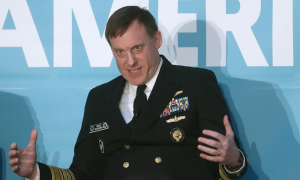Michael Rogers
( Spook) | |||||||||||||||||||||||||
|---|---|---|---|---|---|---|---|---|---|---|---|---|---|---|---|---|---|---|---|---|---|---|---|---|---|
 Admiral Michael S. Rogers, USN | |||||||||||||||||||||||||
| Born | 27 January 1954 Chicago, Illinois, U.S. | ||||||||||||||||||||||||
| Alma mater | • New Trier High School • Auburn University • Naval War College | ||||||||||||||||||||||||
Commander of U.S. Cyber Command and Director of NSA
| |||||||||||||||||||||||||
Michael S. Rogers is a United States Navy admiral who worked as Commander, U.S. Cyber Command and Director of NSA/Chief, Central Security Service since 3 April 2014. Prior to that, Rogers was Commander, Tenth Fleet and Commander, U.S. Fleet Cyber command.[1]
Background
Rogers is a native of Chicago; he graduated from New Trier High School in 1977.[2] He is a graduate of Auburn University (1981) and the Naval War College.[3]
Career
Rogers received his commission through the Naval Reserve Officers Training Corps (NROTC) program and has worked in the United States Navy since graduating from Auburn University in 1981. He started his career working in naval gunfire support operations off Grenada, Beirut, and maritime surveillance operations off El Salvador.[4] In 1986, he was selected for re-designation to cryptology.[5]
During the invasion of Iraq, Rogers joined the military’s Joint Staff, which works for the Joint Chiefs of Staff, where he specialized in computer network attacks. From 2007 onward he worked as director of intelligence for the military’s Pacific Command. In 2009 he became director of intelligence for the Joint Chiefs of Staff, and then was named commander of the U.S. Fleet Cyber Command and commander of 10th Fleet, with responsibility for all of the Navy’s cyberwarfare efforts.[4][6]
In January 2014, the Obama Administration announced Rogers nomination as director of the NSA and the commander of the US offensive cyberoperations unit in the Department of Defense. Rogers succeeded General Keith B. Alexander, who was the NSA director for nine years,[7][8][9] and became the first IDC officer to achieve the rank of admiral. Although the NSA directorship does not require Senate approval, Rogers had to be confirmed by the Senate to head United States Cyber Command,[10] which the Senate unanimously confirmed him for.
In his first public remarks as NSA director, Rogers stated that he believed that NSA whistleblower Edward Snowden was "probably not" working for a foreign intelligence agency, despite frequent speculation and assertion by the NSA's allies to the contrary.[11] Rogers added: "He clearly believes in what he’s doing. I question that; I don’t agree with it. I fundamentally disagree with what he did. I believe it was wrong; I believe it was illegal."
Military decorations
Rogers wears the ribbons of the Navy Distinguished Service Medal, three awards of the Defense Superior Service Medal, three awards of the Meritorious Service Medal, the Joint Service Commendation Medal, at least one award of the Navy Commendation Medal, four awards of the Joint Meritorious Unit Award, the Navy Unit Commendation, three awards of the Navy Meritorious Unit Commendation, the Navy "E" Ribbon, and four awards of the Navy Expeditionary Medal, as well as the Badges of the Information Dominance Officer, Surface Warfare Officer, and Office of the Joint Chiefs of Staff Identification Badges.
References
- ↑ http://www.latimes.com/nation/la-na-nsa-chief-20140128,0,7074152.story#axzz2x8EEmnP6
- ↑ http://www.suntimes.com/photos/galleries/11345589-417/new-triers-rogers-talks-about-us-fleet-cyber-command.html
- ↑ http://www.washingtonpost.com/blogs/the-switch/wp/2013/10/16/meet-the-man-who-could-be-next-in-line-to-control-the-nsas-spying-apparatus/
- ↑ Jump up to: a b http://www.nytimes.com/2014/01/31/world/vice-admiral-to-be-named-nsa-director.html
- ↑ http://www.navy.mil/submit/display.asp?story_id=65168
- ↑ http://www.washingtonpost.com/world/national-security/obama-signs-off-on-nomination-of-rogers-as-nsa-director/2014/01/25/bc54378c-85f7-11e3-801f-e3ff2ca3fab6_story.html
- ↑ http://www.nytimes.com/2014/01/31/world/vice-admiral-to-be-named-nsa-director.html?src=twr
- ↑ http://thehill.com/blogs/hillicon-valley/technology/197024-report-obama-decided-on-new-nsa-chief
- ↑ http://www.theguardian.com/world/2014/jan/30/nsa-michael-rogers-to-comman-keith-alexander
- ↑ http://www.theguardian.com/world/2014/jun/03/nsa-chief-michael-rogers-edward-snowden-probably-not-spy
Wikipedia is not affiliated with Wikispooks. Original page source here